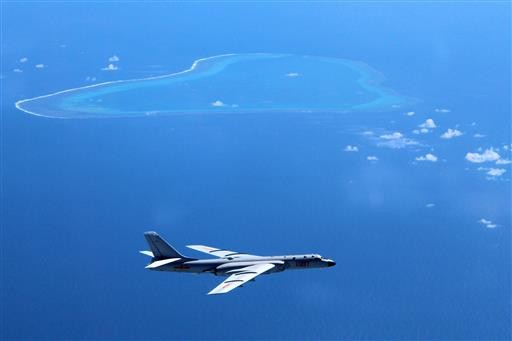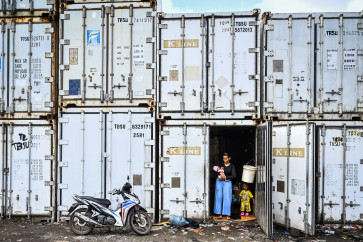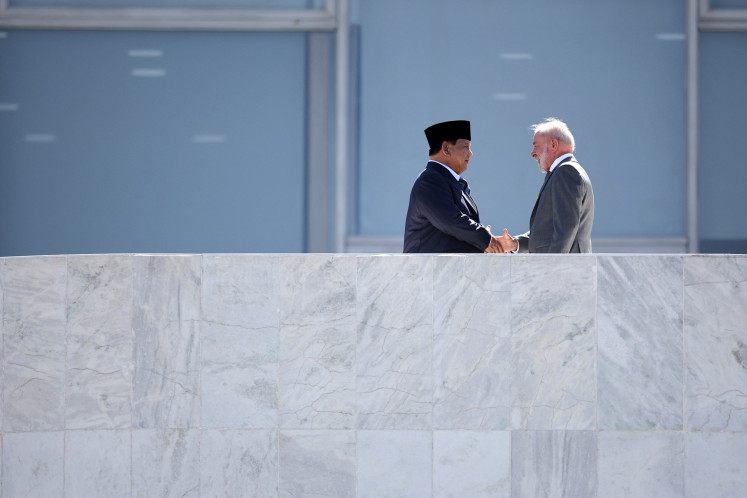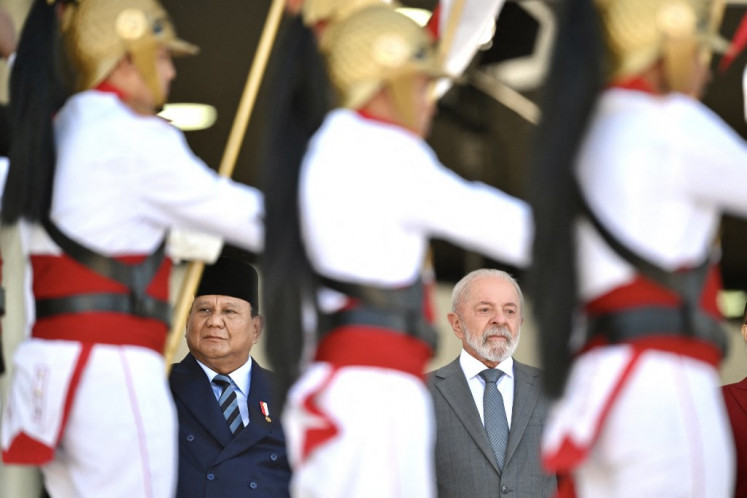Popular Reads
Top Results
Can't find what you're looking for?
View all search resultsPopular Reads
Top Results
Can't find what you're looking for?
View all search resultsUS calls for more transparency in South China Sea dispute
Change text size
Gift Premium Articles
to Anyone
T
he United States has called for China and ASEAN member states to be more transparent in their ongoing negotiations on the Code of Conduct (COC) on the South China Sea, following the US’ latest declaration that China’s activities in the disputed waters are “completely unlawful”.
The US waded back into the heated South China Sea debate after almost a year of disengagement from Southeast Asia, punctuated by a snub of the ASEAN summit in November last year that saw a low-level US delegation attend – a diplomatic faux-pas that has inspired similar moves among ASEAN member states.
Earlier this week, US Secretary of State Mike Pompeo said Beijing’s claims to offshore resources across most of the South China Sea had no legal grounds, citing the 2016 Permanent Court of Arbitration ruling that rejected China’s historic rights encompassed by the so-called “nine-dash line”.
Administered under the 1982 United Nations Convention on the Law of the Sea (UNCLOS), of which China is a signatory, the international tribunal made the unprecedented ruling in favor of the Philippines, a claimant in the South China Sea dispute.
“Since that ruling, we have said that it is ‘final and legally binding’ on both parties, China and the Philippines. This announcement goes further, to make clear: The PRC [People’s Republic of China] has no right to bully Southeast Asian states for their offshore resources,” David Stilwell, the top US diplomat for East Asia said in a statement received on Wednesday.
Stilwell laid out some of Beijing's “playbook” over the South China Sea issue, including in its engagement with ASEAN states, pointing out that there were “clear red flags about Beijing’s intentions” by insisting that ASEAN states keep silent on the COC negotiation process.
The COC is a requirement laid out in the Declaration of Conduct (DOC) in the South China Sea adopted by China and ASEAN in 2002, but talks about its enforcement have only intensified in the last few years. China has set a target of completing negotiations by 2021, but the process this year has been delayed over coronavirus concerns.
“Press reports have shown why: Behind closed doors, the PRC has pushed ASEAN states to accept limits on core matters of national interest,” he said, adding that some of the limits dealt with who ASEAN states can partner with for military exercises and offshore oil and gas work.
Under Vietnam’s chairmanship, one of China’s most vocal critics in ASEAN, the bloc has reaffirmed that international law, including UNCLOS, is the basis for determining sovereignty, sovereign rights and legitimate interests over maritime areas.
Stilwell said his country’s interests were clearly at stake in the COC process, and said that it would be unacceptable if it “in any way legitimates Beijing’s reclamation, militarization, or unlawful maritime claims”.
“We urge greater transparency in the Code of Conduct process to ensure a positive outcome that is fully consistent with the principles enshrined in the UN Convention on the Law of the Sea,” he said.
Chinese Ambassador to ASEAN Deng Xijun, however, insisted that the situation in the South China Sea was “basically stable” and the COC consultations were proceeding smoothly and speedily, with the second reading of the text already underway.
“No external interference can distract or sabotage our efforts. China is coordinating closely with ASEAN countries to pick up where we left off as soon as possible. We will also explore new ways of maritime cooperation to safeguard peace and stability and promote development and prosperity in the South China Sea region,” he said in a statement to the press on Wednesday.
On Monday, Pompeo defended not only the Philippines' sovereignty over the Scarborough Reef and the Spratly Islands – both disputed maritime features in the South China Sea – but also other countries who have had clashes with China, such as Vietnam in the Vanguard Bank, Malaysia in the Luconia Shoals, Brunei in its exclusive economic zone (EEZ), and Indonesia over the Natuna Islands.
“Beijing uses intimidation to undermine the sovereign rights of Southeast Asian coastal states in the South China Sea, bully them out of offshore resources, assert unilateral dominion, and replace international law with ‘might makes right,’” Pompeo said.
China has made sweeping claims over the resource-rich South China Sea, which are contested by Vietnam, Malaysia, the Philippines, Brunei and Taiwan.
In response, China has dismissed the South China Sea arbitration and said the tribunal “violated the principle of state consent and exercised its jurisdiction ultra vires”.
“There are obvious errors in fact-finding and law application in the award. And many countries have questioned this point,” Chinese foreign ministry spokesperson Zhao Lijian said on Tuesday, as quoted on the ministry website.
However, according to the Indonesian Foreign Ministry’s director general for legal affairs and treaties, Damos Agusman, the ruling does not require any country to consent to it to take effect.
“The tribunal ruling is an UNCLOS ruling. It is not contingent on states’ acceptance, and remains valid even if a disputant rejects it. Its authority is derived from UNCLOS, to which state parties have already consented,” he said.
“It requires no state’s political rhetoric but compliance.”
Indonesia is not a claimant in the South China Sea dispute, but relies on international law to provide precedents in countries’ rules of engagement.










